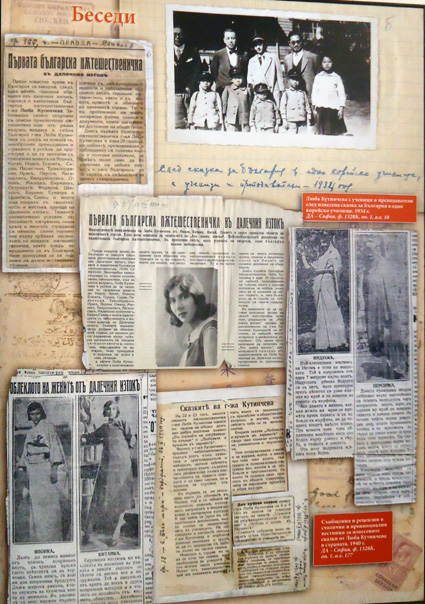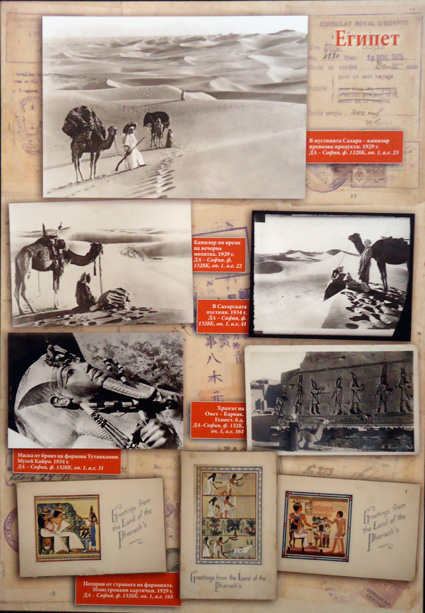A young Bulgarian woman undertook trips to vast lands at the beginning of the past century. "For several years I was able to travel across those distant countries which I was striving to see, but no longer on the wings of my rich imagination but rather in the bites of reality - at the risk of my life, amidst dangerous adventures, untold suffering, misery and tears ", she would write later. Today, her personality is shrouded in mystery and we can get a glimpse of her exquisitely beautiful face only from a preserved black-and-white photograph.
 Lyuba Kutincheva walked the thorny and rocky path, as she put it, that took her to the fabulous world of Syria, Palestine, Egypt, Abyssinia, Iraq, Persia, Afghanistan, India, Ceylon, Borneo, the Philippines, China, Japan and many parts in the Far East covered with mystery and mysticism. She embarked on her first journey in 1929, but a decade later her adventurous spirit was tamed.
Lyuba Kutincheva walked the thorny and rocky path, as she put it, that took her to the fabulous world of Syria, Palestine, Egypt, Abyssinia, Iraq, Persia, Afghanistan, India, Ceylon, Borneo, the Philippines, China, Japan and many parts in the Far East covered with mystery and mysticism. She embarked on her first journey in 1929, but a decade later her adventurous spirit was tamed.
“She set off on her first trip when she was only nineteen, accompanied by her husband, trying to document all the places she went through”, says Mihail Gruev, Chairman of Bulgaria’s State Archives. “Lyuba Kutincheva took photos and put them in something like a scrapbook which contained votive inscriptions – in Arabic, Hindi, Pashto, Aramaic, Japanese, Chinese, etc. Today these texts can be regarded as a textbook in foreign languages.”
The young Bulgarian girl roamed lands and seas – locations that are still a dream for the spirit of discovery of many of her fellow compatriots. But she also got to know the dual side of the world, which repaid her with mental and physical suffering. "I collided with the harsh realities of life and I was able to see how many and what types of negative human activities exist in this world and what lengths human malice, greed, envy and manifestation of the most vile passions can go to," she would later write in her only travelogue dedicated to Japan.
“She was drawn to the charisma of the great anti-colonial leaders of the time. You can see pictures of her with Mahatma Gandhi and his sister, with Jawaharlal Nehru. On the other hand, she was a feminist who sympathized with the struggle for women's rights in the Third World and was trying to help them, writing for prominent Western editions. So she was a modern woman in the modern sense of the word”, says Mihail Gruev.
 It remains a mystery how Lyuba Kutincheva managed to get access to the highest-ranking officials in whose company she posed in photos – the King of Iraq Faisal ibn Hussein, the Sultan of Muscat and Oman Taimur ibn Faisal ibn Turki, the Maharajah of Baroda Sayajirao Gaekwad III and many others. She managed to cross the threshold of places inaccessible to a woman of a different faith, the harems, and get acquainted with the unenviable fate of Muslim women. But wherever she was, she always spoke about Bulgaria and its culture, she sang Bulgarian songs and invariably travelled with a small Bulgarian flag attached to her hat.
It remains a mystery how Lyuba Kutincheva managed to get access to the highest-ranking officials in whose company she posed in photos – the King of Iraq Faisal ibn Hussein, the Sultan of Muscat and Oman Taimur ibn Faisal ibn Turki, the Maharajah of Baroda Sayajirao Gaekwad III and many others. She managed to cross the threshold of places inaccessible to a woman of a different faith, the harems, and get acquainted with the unenviable fate of Muslim women. But wherever she was, she always spoke about Bulgaria and its culture, she sang Bulgarian songs and invariably travelled with a small Bulgarian flag attached to her hat.
Born in 1910 in the town of Veliko Tarnovo, this Bulgarian traveller remained absolutely unknown for 80 years. Only today are historians trying to learn more about her extraordinary destiny. Little is known about her, mainly that she came from a family of intellectuals, that she graduated from high school in Silistra - at that time under Romanian authority, that she moved to her uncle in Turkey and there she gave lectures on Bulgaria. Fluent in French, Romanian, Turkish and Russian, during her travels she also learnt Arabic and Esperanto. In 1935, she moved to Paris to study journalism and worked as a correspondent for "Le Matin". On the eve of World War II - with broken health and after a ten-year absence, she returned to Bulgaria. She died in 1998, but what was her life like during the communist regime - this is another mystery that historians need to unveil.
“She was not persecuted because before the war her pathos was anti-colonial, feminist, i.e. in the broadest sense of the word - leftist, but not communist. This somehow gave her some mitigating circumstances before the new government and was likely the reason why she was not subjected to direct repression although she sank into deep obscurity until the end of her life”, says Mihail Gruev.
In 1968, Lyuba Kutincheva transmitted her archives to the state and they can be viewed at the exhibition "Mission Traveller", which was opened on the Night of Museums at the Archives State Agency.
English version Rossitsa Petcova
Lyuba Kutincheva’s fund is stored at the Sofia-based State Archives.
Photos from the exhibition: Diana TsankovaBulgarian poet and haiku author Vladislav Hristov has won the grand prize in the 79th Basho Memorial English Haiku Contest organized by the Matsuo Basho Memorial Museum in the city of Iga, Japan. For the first time, a Bulgarian has..
Minister of Culture Marian Bachev has opened the Bulgarian stand at the 77th Frankfurt Book Fair. The minister expressed gratitude to the organizers of the Bulgarian Book Association, the Bulgarian Cultural Institute in Berlin and..
The Bulgarian Cultural Institute “Dom Wittgenstein” in Vienna presents the first edition of the “Day of Architecture” series. The event is dedicated to the mutual ties between Austria and Bulgaria in architectural modernism, the Institute announced on..
She is an educated, young woman passionate about astronomy and physics, but has also devoted her energy and talent to the word. She is part of the family..

+359 2 9336 661
